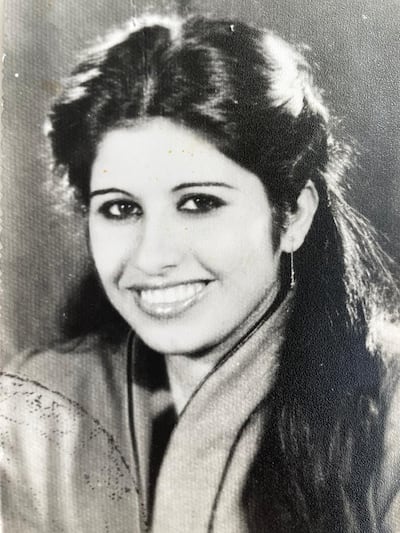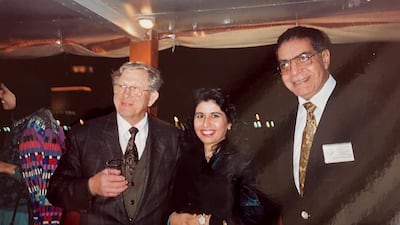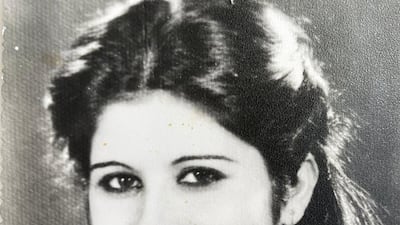Long before the UAE sent its first astronaut to space or appointed the world's youngest minister, a group of trailblazing Emirati women reached for the stars. They were the first generation to receive a third-level education, sent abroad by the country's Founding Father, Sheikh Zayed, to learn crucial skills and return to the UAE to propel the country into a bright new future. To mark the UAE's 50th anniversary, The National has interviewed some of these pioneers.
When Dr Moza Tahwara was born in 1955 in Dubai, dentistry was in its infancy.
People used home remedies to treat toothache and painful extractions were common.
The braces and veneers that guarantee a person pearly whites today were unheard of.
“People used to treat their problems with cloves and salt water,” Dr Tahwara says with a chuckle.
It was also difficult at that time for many women to be treated by a male dentist owing to traditions and social constraints.
But then came change, with trailblazers such as Dr Tahwara rising from a new generation of young Emiratis helping to transform their young country.
Dr Tahwara was born when Dubai was a small fishing town at the Creek. It even had its own passport and borders.
“It was just a desert with a few houses and people," she says. "When I was in secondary school, the UAE became united."
The country grew at a dizzying rate. She finished secondary school in 1976 and was part of a group of about 18 girls who Sheikh Zayed, the Founding Father, sent by private plane to study in Egypt.
While she initially thought about studying engineering, Arabic literature or geology, the Emirati officer in charge of the group encouraged her to pursue dentistry.
"He said: 'Moza, we need dentists. There is no one and I have one [position] allocated for the UAE. You take it'.” Her destiny was sealed.

"Egypt opened doors for us," she says.
In 1981, she graduated from Cairo University with a bachelor's degree in dentistry and returned to the UAE, working at Rashid Hospital in Dubai for two years before travelling again.
She went to the UK and studied for a master’s degree in paediatric dentistry at the University of London.
"I learnt everything about dentistry in London,” she says. "But London also taught me how to be strong. In my first year, I couldn’t go to the hospital alone because I was frightened to take the train or underground.
"My husband, who is a maxillofacial [oral] surgeon and was studying there with me at the time, told me, 'Moza, if you want to build your career, then go by yourself.'"
It was the push she needed and she started to immerse herself in city life, while always keeping one eye on her important work back home.
“He taught me how to travel the first time and then I started going everywhere by myself," she says.
"I even started changing trains. It was nice but for a woman from the UAE who lived a simple life, to live this life was difficult and hectic, but I did it."
Her professors soon recognised her ambition and determination.
“They used to tell me, 'English is your second language but you do good work.' However, I worked hard for that, I used to be in the library until 10pm," she says.

She graduated in 1986 and decided to specialise in orthodontics – a branch of dentistry that treats malocclusion, a condition in which a person's teeth are misaligned.
“I thought it was very nice and thought to myself, that is where I want to be," she says.
Dr Tahwara obtained a master’s degree in orthodontics at the University of London in 1990 before returning to the UAE, where she started the paediatric and orthodontic department at Rashid Hospital.
She was the first Emirati orthodontist. She also helped to start the Emirates Orthodontic Society and began organising conferences and giving lectures.
She was named as head of the Arab Orthodontic Association in 2009.
Did she ever face difficulties working in what had typically been a male profession? Quite the contrary.
“People accepted a lady dentist because they preferred a woman. I had so many patients who were ashamed to go to a male dentist," she says.
“When I came, they were really happy to see a female dentist. They were not shy. Before they were wearing burqas and would not open their mouth in front of man – even my own mother would not eat in front of my father."
Through the years, she established her own private clinic before retiring in 2018. Looking back on those early years as the UAE marks a special anniversary, Dr Tahwara is among the small band of people who recall what life was like before the boom.
"We lived a good family life, but how will the young generation relax when they reach our age? They are always running. They are like machines.," she says.
"We saw the poor and simple life and we saw this big evolution. The young generation are always running, running, running."
Dr Tahwara, who has a son and daughter, also worked hard and faced the same challenges in balancing her personal and professional life. She wishes she had spent more time with her family instead of working.
“I am sorry that I missed being around when they were babies. If time went back I would also be with my children. I am sorry I wasn’t there,” she says.
She first saw Sheikh Zayed when he visited her school during the mid-1970s and she speaks with admiration about the man who drove the UAE forward.
“He believed that all the money in the UAE belonged to his people: to build houses, to study and live a decent life. He spent a lot of money for Emiratis to study abroad and gave us salaries," she says.
"We all considered him our father and we are his children. He came to visit us in Cairo and it was like a father coming to see his children."





